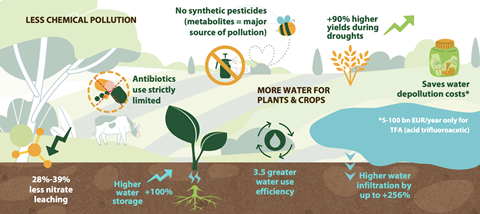The European organic community descended on Warsaw, Poland, last month for discussions on the need for adequate funding for organic farming and greater recognition of its role in improving water quality

This year’s European Organic Congress, co-organised by IFOAM Organics Europe and the Polish Chamber of Organic Food (PIZE), brought together over 200 members of the European organic community in Warsaw on 25-27 June for discussions on the future of organic farming.
Supported by the Polish ministry of agriculture under the Polish Presidency of the EU Council, topics at the conference included the Common Agricultural Policy (CAP), new genomic techniques (NGTs), pesticide reduction, generational renewal, the EU organic regulation and market trends.
In his keynote speech, Jürn Sanders of FiBL highlighted the need to go beyond short-term gains and include profitability within planetary boundaries.
According to IFOAM, the entire agricultural sector is united in calling for a sufficient budget to be allocated for the next CAP, with organic farming prioritised and recognised as a strategic asset.
It also argued that organic farming be recognised and funded as a nature-based solution for water resilience. “Organic improves water quality: evidence from France shows organic farming helps reduce pesticide pollution, leading water agencies to co-fund conversions to organic,” said IFOAM.
Following the rejection of binding pesticide reduction targets by the European Parliament in 2023, the spotlight is now on the upcoming EU proposal on biocontrol, expected in 2025. Discussions at the summit focused on how to ensure quicker access to safe, natural substances for organic farmers - and whether taxation on synthetic pesticides could be a viable policy alternative.
Despite fluctuations in growth, IFOAM reported, long-term projections to 2033 showed a positive and sustainable development path for organic. However, it stressed the importance of targets and the need to empower young people in the movement.
“Targets matter,” the organisation stated. “Countries with higher organic land targets also show stronger market performance.
“The future is organic – and the future of organic is youth. To secure the future of food and farming, the organic movement must empower young people with purpose, a voice and responsibility – through bold action, meaningful inclusion and investment in education and connection across the value chain.”



